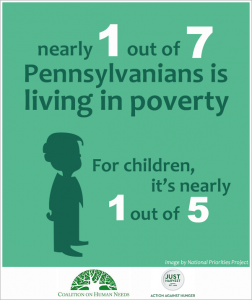Just Harvest Calls on Congress to End Harmful Sequestration Caps and Invest in Human Needs Programs
PITTSBURGH, PA – Just Harvest has issued a report containing recent data released by the U.S. Census Bureau, which show that 13.6% of Pennsylvanians were living in poverty in 2014 – an amount that has barely budged since 2013, when 13.7% were poor. A bit more progress was made in Allegheny County, where the poverty rate went from 13.8% to 13.3% in that same time period.
 The number of poor children in Pennsylvania in 2014 remained stuck at the unconscionably high rate of 1 in 5 children (19.4%) under the age of 18 living below the poverty line, with Allegheny County’s child poverty rate also virtually unchanged at 18.7%.
The number of poor children in Pennsylvania in 2014 remained stuck at the unconscionably high rate of 1 in 5 children (19.4%) under the age of 18 living below the poverty line, with Allegheny County’s child poverty rate also virtually unchanged at 18.7%.
As is true nationally, poverty among minorities remains much higher than the overall poverty rate, with nearly 30% of African-Americans and 38.6% of African-American children in Pennsylvania living in poverty. The poverty rate for minorities is even worse in Allegheny County, where 37% of African-Americans and 55% of African-American children live in poverty.
“Safety net programs cut poverty in half in 2012, but since then progress has stalled due to 2013 sequestration cuts in those programs,” said Ken Regal, executive director of Just Harvest. “If Congress does not act, funding cuts scheduled to take effect this fall will leave Pennsylvania even further behind. In Congress’s budget outline, there will be record lows for spending on everything from education to roads to health care – the programs that help Pennsylvanians and all Americans succeed.”
Two-thirds of proposed non-defense cuts are slated to come from programs for low- and moderate-income people, including WIC, food stamps, and other proven anti-poverty programs. Said Regal, “Members of Congress should undo the sequestration caps so we can expand – not cut – programs that prevent and eliminate poverty in Allegheny County and Pennsylvania.”
In addition to Congress needing to take corrective action on the budget to prevent worsening poverty, federal legislators must also make permanent key provisions of the Earned Income Tax Credit and the Child Tax Credit that are otherwise set to expire at the end of 2017. Failing to do so would result in 50 million Americans, including 25 million children, losing part or all of their EITC or CTC benefits; 16 million Americans, including 8 million children, would fall into – or deeper into – poverty.
In PA that would be 381,000 families and 750,000 children affected with 179,000 children pushed deeper into poverty. Also affected would be 34,000 veterans and military families and 175,000 millennial workers. The cost to PA would be $410 million.
A sample of findings from the report:
- For a family of four in 2014, the official poverty line was less than $24,230 and despite this low threshold, more than 765,00 Pennsylvanians live on far less, below half the poverty line.
- Nearly 1 out of 7 Pennsylvanians is living in poverty and for children it’s nearly 1 out of 5.
- There was virtually no change in child poverty rates in Allegheny County, now at 18.7%, since 2013.
- The statistics are much worse for children of color in Allegheny County than they are for children of color in PA overall: 55.5% of African-American children live in poverty, compared to 38.6% of African-American children statewide.
- At the current rate, cutting poverty in half nationally would take more than 25 years – roughly 25 years for child poverty.
- Under Congress’s proposed budget, the Earned Income Tax Credit and Child Tax Credit improvements will be allowed to expire, pushing 398,000 Pennsylvanians, including 179,000 children, into or deeper into poverty.
- There are 24 million adults with low skill levels working in the U.S and roughly 14.5 million of them earn less than $28,000 a year, placing them in the lowest 30% of earnings for all full-time workers.
- Since 2005, the nutrition network for seniors has served 17 million fewer meals all while waiting lists continue to mount in every state.
- Ending extra tax breaks for hedge fund managers would save about $1.4 billion per year which is nearly enough to fund the $1.5 billion to cover full day, full year program for all children in Head Start.
- In 2014 housing subsidies lifted 2.8 million Americans out of poverty, and SNAP lifted 4.7 million people out of poverty across the U.S.




It is a disgrace that such numbers exist in a city where the economy seems to be booming for one sector of society and the same sector turns a blind eye to these staggering statistics. As you can see by the stated facts the great racial divide is evident at every level including how poor people are not just deprived of a good nutritional meal, but also the inability to get a quality education in the City of Pittsburgh and the impoverished communities in and around Allegheny County. There should be shared shame of those who eat well and turn a blind eye to the hunger and despair of so many people.